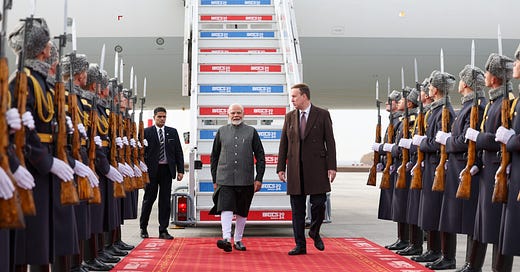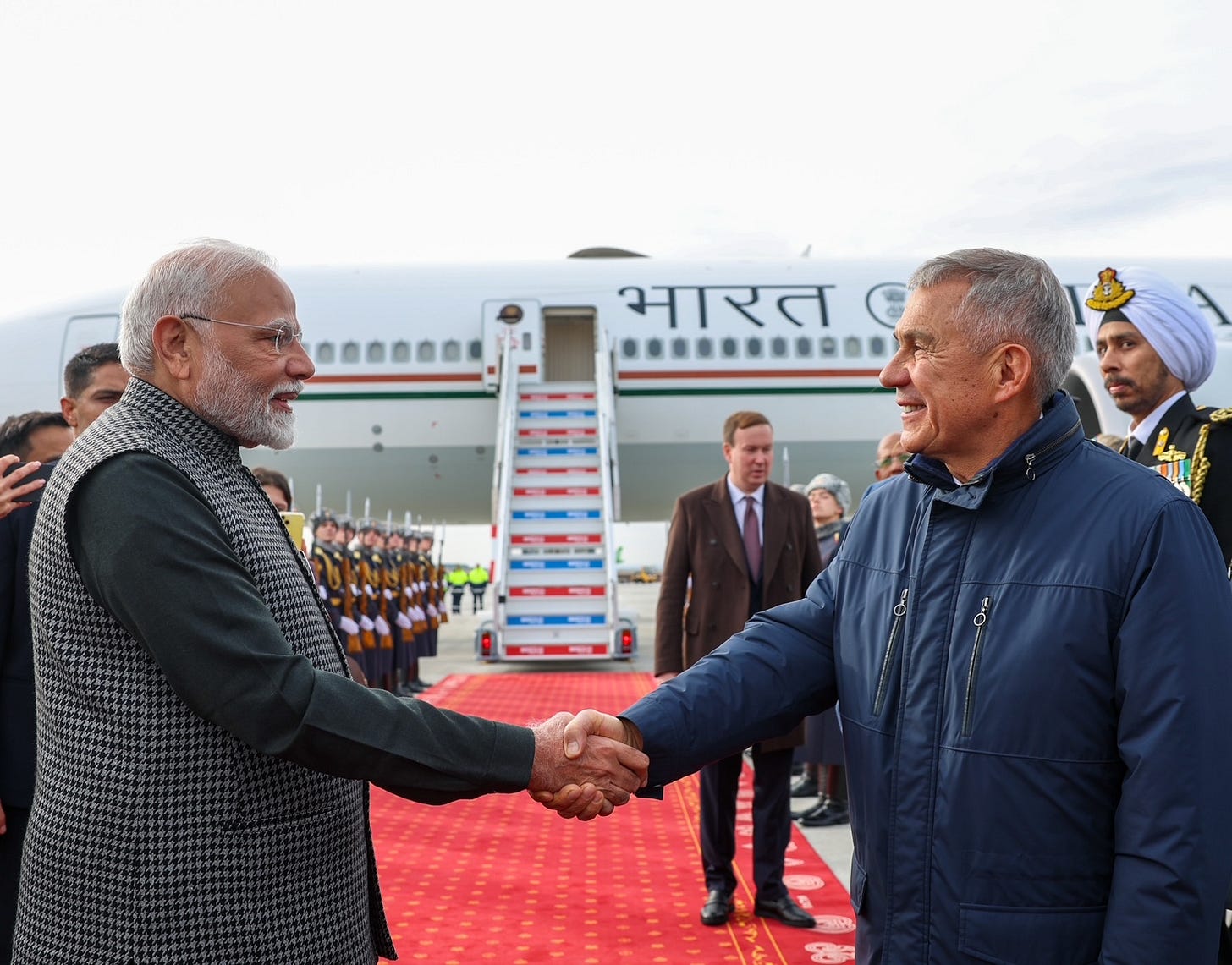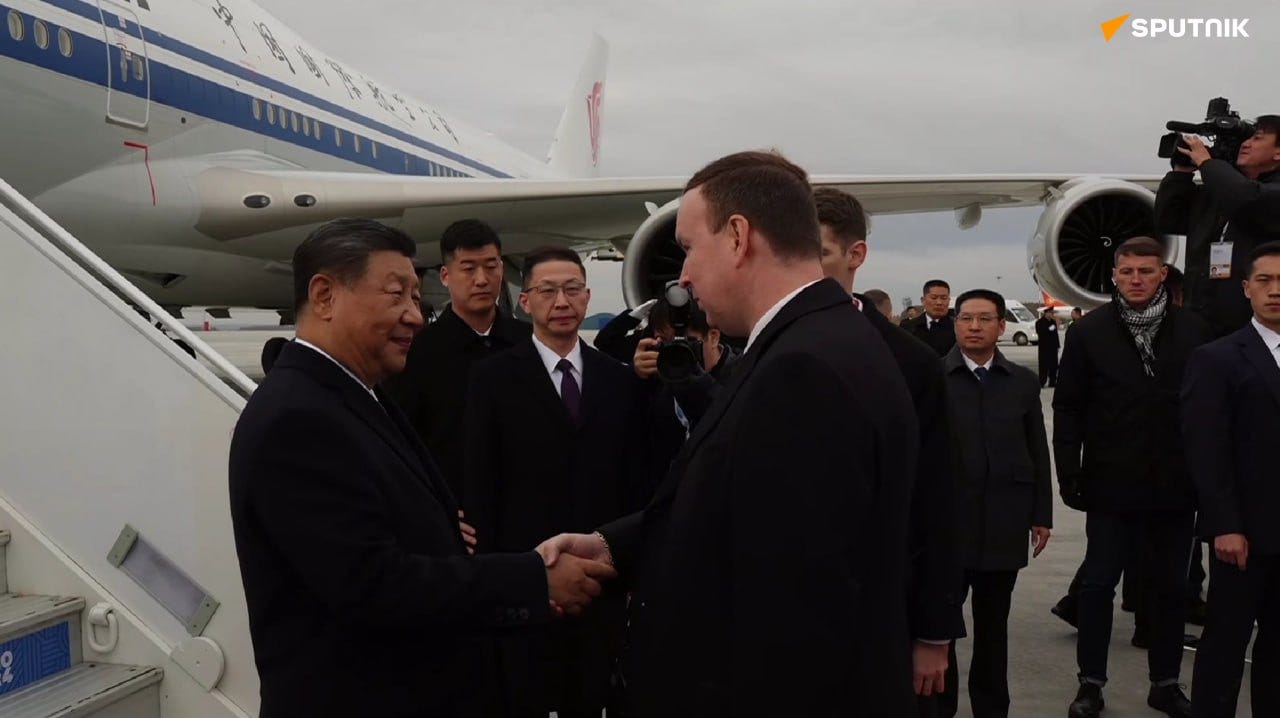PM Modi's Arrives in Kazan, Russia: BRICS on the Global Stage
Russian President Vladimir Putin's reiterates Prime Minister Modi's vision of BRICS as a "non-Western" rather than an "anti-Western" group.
PM Modi's Arrives in Kazan for the BRICS Summit
Prime Minister Narendra Modi touched down in Kazan, Russia, on Tuesday, October 22, 2024, to participate in the 16th BRICS Summit. This summit is historic as it marks the first meeting of the expanded BRICS membership, setting the stage for an evolution in global governance and multilateral cooperation. Under Russia's chairmanship, the summit carries the theme "Strengthening Multilateralism for Just Global Development and Security," and seeks to redefine the global economic landscape through its diverse and inclusive group of nations.
One of the defining moments leading up to this summit was Russian President Vladimir Putin's reiteration of Prime Minister Modi's vision of BRICS as a "non-Western" group rather than an "anti-Western" alliance. Addressing foreign journalists ahead of the summit, Putin highlighted PM Modi's words, stating that BRICS was never intended to oppose Western countries but to offer an alternative model for global cooperation based on shared interests among non-Western nations.
"BRICS was never meant to be against anyone. The Indian Prime Minister said that BRICS is not an anti-western group; it is a non-western group," Putin remarked. This emphasis on non-confrontation aligns with the group’s stated goal of fostering multilateralism, economic development, and cooperation across regions without drawing sharp ideological divides.
The Genesis of BRICS
BRICS traces its origins to 2001 when Jim O’Neill of Goldman Sachs introduced the concept of a grouping of emerging economies—Brazil, Russia, India, and China. These countries were seen as the next potential global economic powerhouses. The acronym BRIC symbolised the significant economic growth potential of these nations and their growing influence on global affairs.
However, it wasn’t until June 16, 2009, that BRIC formally took shape as an organisation. The first official summit was held in Yekaterinburg, Russia, where the founding members, Brazil, Russia, India, and China, committed to enhancing multilateralism and promoting global economic development. In 2010, South Africa joined, and BRIC became BRICS, representing the African continent and further diversifying the group's global reach.
BRICS Evolution: A Focus on Inclusivity and Expansion
Over the years, BRICS has evolved from a loose economic grouping into a more structured and influential body in global governance. One of the most critical moments in BRICS' history was its expansion on January 1, 2024, when five new countries—Egypt, Ethiopia, Iran, Saudi Arabia, and the United Arab Emirates—were inducted as full members. This expanded group now represents 10 nations, with a combined population of nearly half the world, and commands a substantial share of global trade and economic output.
The expansion marks a strategic move towards inclusivity and global cooperation. With these new members, BRICS now encompasses diverse regions, including Africa, the Middle East, and the Gulf, further enhancing its role as a platform for non-Western countries to voice their interests and shape the global order.
Key Agenda at the 2024 BRICS Summit
The 2024 BRICS Summit in Kazan includes several key items on its agenda, reflecting the bloc's focus on contemporary global challenges. Among the top discussions are the escalating situation in the Middle East, a proposal for the creation of a new category of "partner nations" within BRICS, and the development of a BRICS-led payment system to rival SWIFT, aimed at reducing dependency on Western financial systems. Russian President Putin's emphasis on establishing this alternative payment system highlights the group’s ambition to secure financial independence on the global stage.
Other crucial areas of cooperation include information security, where the development of a code of ethics for the application of artificial intelligence (AI) is under discussion. BRICS members are also focusing on fighting corruption, addressing capital flight, taxation, and customs regulations. Sustainable development remains a priority, with energy transition policies that balance national economic interests with global climate goals being a central theme. In a move aimed at global health security, the summit will see the establishment of a BRICS Medical Association, which will focus on creating early warning systems for infectious diseases and epidemics.
Strategic Cooperation for the Future
The summit's discussions will take place in both restricted and expanded formats, allowing BRICS leaders to exchange views on global and regional issues. The three main pillars of cooperation—politics and security, economy and finance, and cultural and humanitarian ties—will guide these discussions. Despite the ambitious agenda, it remains be seen whether all items will result in concrete resolutions, as BRICS members often have diverse perspectives and approaches to these complex issues.
Looking Ahead: BRICS’ Future and Global Impact
The 16th BRICS Summit in Kazan offers an opportunity for member countries to discuss and implement strategies that reflect the growing significance of the bloc on the world stage. Prime Minister Modi, in particular, is expected to push for deeper economic cooperation and multilateralism, addressing issues ranging from trade imbalances to climate change.
BRICS now represents 45 percent of the world's population, 28 percent of global economic output, and nearly half of international trade. With its expanded membership, the group is poised to play an even more significant role in global decision-making, potentially offering a counterbalance to traditional Western-dominated institutions such as the G7 and the IMF.
As BRICS continues to grow and adapt, its ability to provide a platform for diverse economies to collaborate on shared goals, from infrastructure development to digital transformation, will shape its future relevance. Prime Minister Modi’s presence at this summit reaffirms India’s leadership role within the bloc and its commitment to a more just and equitable global order.
India-Russia Synergy Evident
Prime Minister Modi’s arrival in Kazan for the 16th BRICS Summit highlights the deepening India-Russia synergy within the bloc. This cooperation extends beyond President Putin’s endorsement of Modi’s vision of BRICS as a "non-Western" alliance. Russia’s behind-the-scenes diplomacy has played a key role in facilitating the recent thaw in India-China relations, with the two nations agreeing on patrolling arrangements along the LAC in Ladakh just before the summit.
The pervasive synergy between India and Russia is crucial for BRICS’ evolving role on the global stage. Their shared commitment to multilateralism and regional stability strengthens the bloc’s ability to offer a new model of global cooperation, positioning BRICS as a significant force in shaping the 21st-century world order.
India-China Thaw Ahead of the BRICS Summit
Just ahead of the 2024 BRICS Summit, India and China reached a crucial agreement on patrolling arrangements along the Line of Actual Control (LAC) in eastern Ladakh, marking a significant step towards easing long-standing border tensions. Announced by Indian Foreign Secretary Vikram Misri on October 21, 2024, this breakthrough is seen by many as the result of Russia’s quiet diplomacy, with President Putin playing a key role behind the scenes. This agreement is expected to foster a more congenial atmosphere within BRICS, enhancing cooperation between the two Asian giants and contributing to a more cohesive global platform.
China’s influence in BRICS, as the world’s second most populous nation and second-largest economy, remains undeniable. Even during periods of border standoff, both India and China exhibited remarkable restraint and maturity, preventing the situation from escalating. In fact, trade between the two nations reached an all-time high despite tensions. With the easing of border disputes and the possibility of a bilateral meeting between Prime Minister Modi and President Xi Jinping, peace and security in South Asia are expected to improve. This renewed rapport between India and China, with Russia playing a moderating role, promises not only regional stability but also the overall strengthening of BRICS as a unified force for global cooperation.
As BRICS evolves, the synergy between these three powers—India, China, and Russia—sets the stage for growth, stability, and mutual cooperation, further reinforcing the group’s capacity to address global challenges. The expanded BRICS, with its new members, is poised to play an increasingly constructive role on the world stage.








……. any global growth, stability, and addressing global challenges without the active participation of Western countries & USA etc can’t be imagined. The sessions of BRICS can only make the participants confident in themselves to jointly counter pressure from USA & its close allies and try to play/exhibit at least some part in constructive role on the world stage.